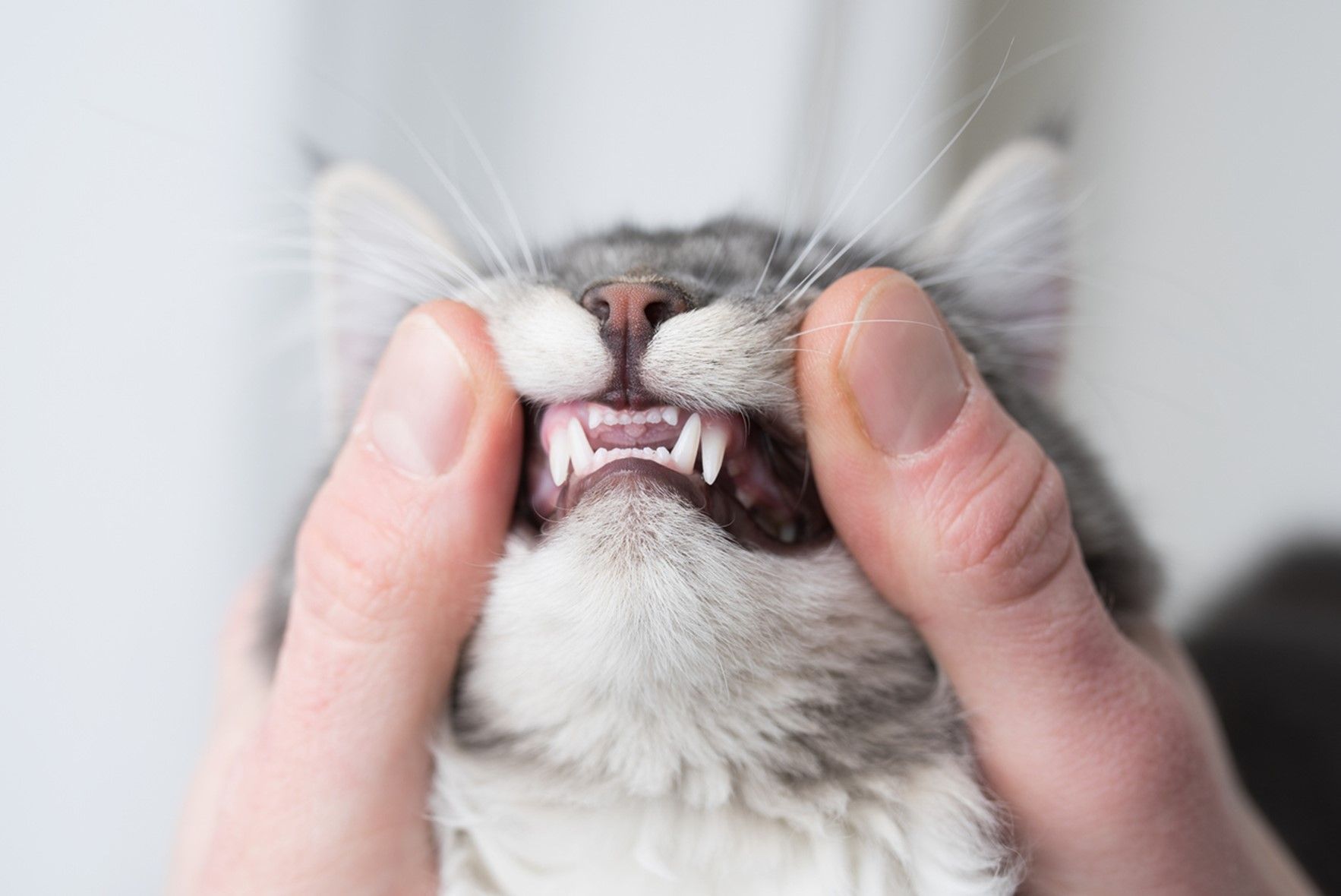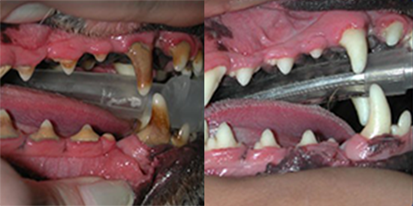
February is National Pet Dental Health Month!
January 16th, 2023

Pet dental health is essential for your pet's overall health and longevity. But did you know that 85% of cats and dogs over the age of three have periodontal disease?
Dental disease is no laughing matter
We take dentistry very seriously in our practice. It is not just about having shiny white teeth. We all know that the mouth's health affects the rest of the body. If dental disease is left untreated, it can lead to other severe illnesses in the body. Establishing good oral hygiene habits for your pet is essential in battling dental disease.
How does my pet get a dental disease?
Dental disease starts with bacteria buildup in the mouth. These bacteria form a film over the teeth called plaque. Gingivitis (inflammation of the gum tissue) and periodontitis (inflammation of the deeper tissues around the roots of the teeth) are caused by an invisible slime of bacteria that forms initially on the crowns of the teeth and, in time will extend below the gum line to the roots. This slime is a biofilm and is specifically known as dental plaque.
Preventing PlaQue = Preventing Disease
If the plaque film is removed mechanically daily, it does not progress beyond that stage. On the other hand, if the plaque is left undisturbed, it grows ever thicker. Within a few days, the mature plaque film can accumulate minerals from the saliva to form hard dental tartar.
While immature plaque can be fairly easily removed (toothbrush, special diets, appropriate chew treats), once it becomes mineralized to tartar, it is much harder to remove.
How do I know if my pet has a dental problem?
Regardless of any problems, your pet's teeth should be checked at least once a year by your veterinarian for early signs of a problem and to keep your pet's mouth healthy.
Have your pet's teeth checked sooner if you observe any of the following problems:
• Bad breath
• Broken or loose teeth
• Extra teeth or retained baby teeth
• Teeth that are discolored or covered in tartar
• Abnormal chewing, drooling, or dropping food from the mouth
• Reduced appetite or refusal to eat
• Pain in or around the mouth
• Bleeding from the mouth
• Swelling in the areas surrounding the mouth
Some pets become irritable when they have dental problems, and any changes in your pet's behavior should prompt a call to our office.
Feline Juvenile Gingivitis
Feline Juvenile Gingivitis refers to inflammation of the gums following the eruption of a kitten's permanent teeth (around 6-7 months). While it is not a comm problem, we see it most in kittens of oriental breeds.
Kittens suffering from juvenile gingivitis have redness, swelling, and inflammation of their gum tissue (gingiva). The cause of this disease is not known, but an exaggerated inflammatory response to tooth eruption, abnormal activity of immune cells, and viral exposure (FIV, FeLV, Calicivirus) have all been proposed as triggers.
Untreated juvenile gingivitis can lead to juvenile periodontitis. When this occurs, the immune system goes into overdrive, attacking the teeth and gums and causing bone loss.
To have any chance of halting and controlling these conditions, aggressive and early intervention is required. If left untreated, they will rapidly progress to severe periodontal disease.
It is generally accepted that the susceptibility of patients to develop this condition (juvenile periodontitis) will often subside by two years of age.
If you suspect your kitten is suffering from juvenile gingivitis, call us to set up an examination by one of our veterinarians.

WHY IS PROFESSIONAL PET DENTAL CARE SO CRITICAL?
Professional pet dental care involves a trained veterinarian's examination, X-rays, and teeth cleaning. Dr. Jeannine Kinney is experienced in preventing, locating, and treating any issues that might go unnoticed by even the most dedicated pet owner. In addition to home care, it is best to get professional dental care for your pet throughout its life. You can see from our before, and after pictures below the remarkable difference our professional pet dental services can make in the health of your pets' teeth and gums!
What can I do at home to care for my pet's teeth?
You can do a lot at home between professional dental care to help your pet maintain healthy teeth and gums. To keep your pet's teeth healthy, it takes daily care to remove plaque and professional care, as described above, to remove tartar and treat dental disease. So we can work together to keep your pet's teeth healthy.
1. Brush their teeth. Brushing your pet's teeth may seem extreme to some, but it is hugely beneficial for your pet. Try brushing your pet's teeth twice a day. You can find pet toothbrushes and toothpaste such as Virbac C.E.T toothpaste. It has different pet flavors, including poultry, seafood, and beef. Also, brushing a dog or cat's teeth differs from brushing your teeth. Here is an excellent video from the AVMA on how to brush your pet's teeth.
2. Use tooth wipes. Tooth wipes are a faster and easier solution than brushing your pet's teeth, although slightly less effective.
3. Give them dental treats/chews. There are many treats and chew toys that you can buy for your pet that help remove plaque and improve dental health.
Another common dental problem is broken teeth. Chewing on hard toys and treats like antlers and bones can damage your dog or cat's teeth. A broken tooth can expose the tooth's nerve, which is very painful for your pet. Additionally, the exposed nerve can become infected and cause even more problems for your pet, possibly resulting in a need for tooth extraction.
Get ready for our February Pet Dental Month Discount!
Our 10% February discount will also include dental foods and diets, dental chews, and anything else dental-related. We are booking February dental appointments now, so don't wait, schedule now!
Final Words
Your Friends at
Oak Creek Small Animal Clinic


